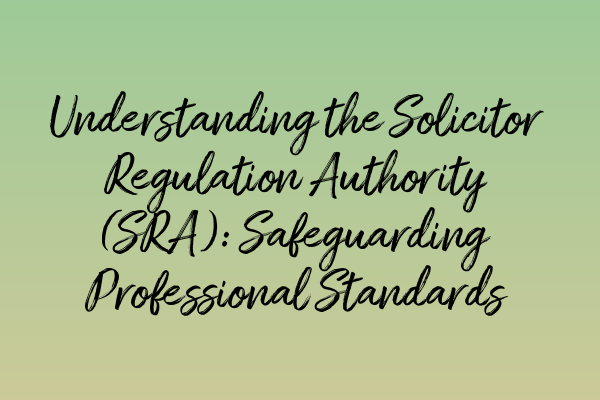Understanding the Solicitor Regulation Authority (SRA): Safeguarding Professional Standards
As a solicitor, it is crucial to understand the role and importance of the Solicitor Regulation Authority (SRA) in safeguarding professional standards. The SRA is the independent regulatory body responsible for overseeing solicitors and law firms in England and Wales, ensuring that they uphold the highest standards of professionalism, integrity, and ethics.
In this blog post, we will delve into the functions and responsibilities of the SRA, as well as its impact on solicitors, law firms, and the legal profession as a whole. By gaining a comprehensive understanding of the SRA, solicitors can navigate their professional journeys with confidence, knowing they are held to a high standard of practice.
1. Role of the Solicitor Regulation Authority
The SRA plays a crucial role in maintaining the reputation and public trust in the legal profession. Its primary responsibilities include:
– Setting and enforcing professional standards: The SRA sets the standards and regulatory frameworks that solicitors and law firms must adhere to. By enforcing these standards, it ensures that solicitors provide quality legal services while upholding ethical guidelines.
– Protecting consumers and the public interest: The SRA works tirelessly to protect the interests of clients and the wider public. It does so by ensuring that solicitors maintain the necessary skills, competence, and financial soundness to serve their clients effectively.
– Promoting equality, diversity, and inclusion: The SRA is dedicated to promoting equality, diversity, and inclusion within the legal profession. It sets rules and regulations that firms and solicitors must adhere to in order to create a more inclusive and representative legal community.
2. Regulatory Framework
The SRA operates under a comprehensive regulatory framework designed to maintain high professional standards among solicitors. This framework includes:
– Code of Conduct: The Code of Conduct sets out the ethical and professional standards that solicitors and law firms must adhere to. It covers various aspects, such as client care, integrity, confidentiality, and professional competence.
– Standards and Regulations: The SRA regularly reviews and updates its standards and regulations to ensure they reflect the evolving needs and expectations of the legal profession. Solicitors must stay abreast of these changes to ensure they remain compliant.
– Compliance and Enforcement: The SRA has the power to investigate complaints, conduct audits, and take disciplinary actions against solicitors and law firms that breach the regulatory requirements. It enforces sanctions ranging from fines to the revocation of practicing licenses.
3. Benefits of SRA Regulation
The SRA regulation offers numerous benefits to solicitors and the legal profession as a whole. These benefits include:
– Upholding professional integrity: The SRA ensures that solicitors maintain the highest levels of integrity, professionalism, and ethical conduct. This not only safeguards the profession’s reputation but also instills public confidence in the legal system.
– Enhancing client protection: By enforcing strict standards, the SRA protects clients from inadequate legal services, misconduct, or malpractice. This provides clients with the confidence and assurance that their rights and interests are safeguarded.
– Promoting a level playing field: The SRA’s regulatory framework promotes fair competition among solicitors and law firms. It ensures that all practitioners adhere to the same standards, creating a level playing field for solicitors at various stages of their careers.
– Fostering professional development: The SRA encourages continuous learning and development among solicitors. This not only ensures that they stay up-to-date with legal developments but also allows them to enhance their skills and competencies to better serve their clients.
In conclusion, understanding the role and functions of the Solicitor Regulation Authority (SRA) is essential for solicitors seeking to uphold professional standards and ensure client protection. The SRA’s regulatory framework, which emphasizes ethics, integrity, and client care, serves as a crucial pillar of the legal profession in England and Wales.
To excel in your legal career, it is important to stay informed and comply with the SRA’s standards and regulations. By doing so, you can uphold the reputation of the legal profession, protect the interests of your clients, and contribute to a fair and just legal system.
Related Articles:
– SQE Prep Made Easy: Strategies and Resources
– SQE Prep: Tips and Tricks to Excel in Criminal Law
– Terrorism and Criminal Law: Balancing National Security with Justice
– Cross-Examination Techniques: Mastering the Art of Questioning
– Private Prosecutions: Exploring Non-Governmental Prosecutions in Criminal Cases


Leave a Reply